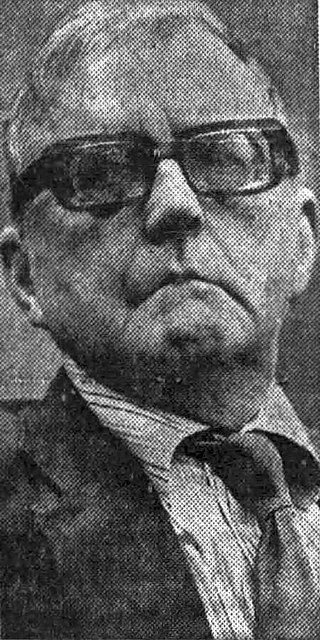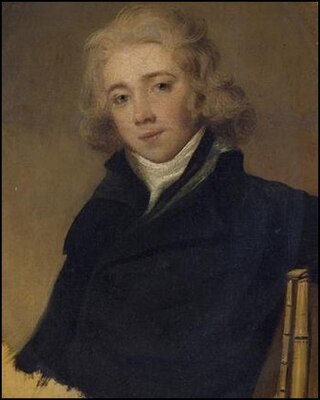
The term string quartet refers to either a type of musical composition or a group of four people who play them. Many composers from the mid-18th century onwards wrote string quartets. The associated musical ensemble consists of two violinists, a violist, and a cellist. The double bass is almost never used in the ensemble mainly because it would sound too loud and heavy.

The String Quartet No. 15 in E-flat minor, Op. 144 by Dmitri Shostakovich is the composer's last. It was his first quartet since the Sixth which did not bear a dedication.

The Piano Trio No. 2 in E minor, Op. 67, is a piece for violin, cello and piano by the Russian composer Dmitri Shostakovich, started in late 1943 and completed in August the following year. It was premiered on 14 November 1944. The piece was dedicated to his close friend Ivan Sollertinsky, whose death in February 1944 affected Shostakovich profoundly.
Dmitri Shostakovich's String Quartet No. 1 in C major, Op. 49, was composed in six weeks during the summer of 1938. He began to work on the quartet on the morning of May 10, 1938. It carries no dedication. Shostakovich said that in this quartet he had "visualized childhood scenes, somewhat naïve and bright moods associated with spring."
Dmitri Shostakovich's String Quartet No. 14 in F-sharp major, Op. 142, was composed in 1972–73. It is dedicated to Sergei Shirinsky, the cellist of the Beethoven Quartet, the ensemble that premiered most of Shostakovich's quartets. The first performance was held in Leningrad on November 12, 1973.
Dmitri Shostakovich's String Quartet No. 2 in A major, Op. 68, was completed in September 1944 in just nineteen days in Ivanovo, 300 kilometres north-east of Moscow. It was premiered by the Beethoven Quartet and is dedicated to the composer Vissarion Shebalin. When Shostakovich began writing his Second String Quartet he had already completed eight of his fifteen symphonies. He was also half-way through his life. Another thirteen quartets remained to be composed, however, and they would come in rapid succession.
Dmitri Shostakovich's String Quartet No. 3 in F major, Op. 73, was composed in 1946. He wrote most of it between May and August of 1946 while visiting his summer home in Kellomäki. The Quartet was premiered in Moscow by the Beethoven Quartet, to whom it is dedicated, in December 1946.
Dmitri Shostakovich's String Quartet No. 5 in B-flat major, Op. 92, was composed in autumn 1952. It was premiered in Leningrad in November 1953 by the Beethoven Quartet, to whom it is dedicated.
Dmitri Shostakovich's String Quartet No. 6 in G major, Op. 101, was composed in the summer of 1956. It was premiered by the Beethoven Quartet in October 1956. It carries no dedication. The Beethoven Quartet recorded this work on the Mezhdunarodnaya Kniga label.
Dmitri Shostakovich's String Quartet No. 9 in E-flat major, Op. 117, was composed in 1964 and premiered by the Beethoven Quartet. The Ninth Quartet was dedicated to his third wife, Irina Antonovna Shostakovich, a young editor he married in 1962.

Dmitri Shostakovich's String Quartet No. 10 in A-flat major, Op. 118, was composed from 9 to 20 July 1964. It was premiered by the Beethoven Quartet in Moscow and is dedicated to composer Mieczysław (Moisei) Weinberg, a close friend of Shostakovich. It has been described as cultivating the uncertain mood of his earlier Stalin-era quartets, as well as foreshadowing the austerity and emotional distance of his later works. The quartet typified the preference for chamber music over large scale works, such as symphonies, that characterised his late period. According to musicologist Richard Taruskin, this made him the first Russian composer to devote so much time to the string quartet medium.
Dmitri Shostakovich's String Quartet No. 11 in F minor, Op. 122 was finished on January 30, 1966, in Moscow. It was premiered by the Beethoven Quartet and is the first in a series of four quartets to be dedicated to members of the Quartet. Vasily Shirinsky was the dedicatee of the Eleventh, the quartet's second violinist, who died on August 16 of the previous year.
Dmitri Shostakovich's String Quartet No. 13 in B-flat minor, Op. 138, was first conceived in 1969, and completed in 1970 as Shostakovich was undergoing treatment at the Russian Ilizarov Scientific Center for Restorative Traumatology and Orthopaedics in Kurgan.

Hyacinthe Jadin was a French composer who came from a musical family. His uncle Georges Jadin was a composer in Versailles and Paris, along with his father Jean Jadin, who had played bassoon for the French Royal Orchestra. He was one of five musical brothers, the best known of whom was Louis-Emmanuel Jadin.
The Op. 33 String Quartets were written by Joseph Haydn in the summer and Autumn of 1781 for the Viennese publisher Artaria. This set of string quartets has several nicknames, the most common of which is the "Russian" quartets, because Haydn dedicated the quartets to the Grand Duke Paul of Russia and many of the quartets were premiered on Christmas Day, 1781, at the Viennese apartment of the Duke's wife, the Grand Duchess Maria Feodorovna. Some scholars theorize that the "Russian" quartets were the inspiration for Mozart's six string quartets dedicated to Haydn, but no direct evidence has been found.
Johannes Brahms' String Quartet No. 1 in C minor and String Quartet No. 2 in A minor were completed in Tutzing, Bavaria, during the summer of 1873, and published together that autumn as Op. 51. They are dedicated to his friend Theodor Billroth. He only published one other string quartet, No. 3 in B-flat Major, in 1876.
The Quartet Movement in E-flat major, also known as the Unfinished Quartet, is the first movement of a projected string quartet in E-flat major by Dmitri Shostakovich, rediscovered in 2003.
Joseph Haydn's String Quartets, Op. 64, is a set of six string quartets composed in 1790. Along with six earlier quartets published under the opus numbers 54 and 55, they are known as the Tost quartets, after the Hungarian violinist and later merchant Johann Tost who helped Haydn find a publisher for the works. Unlike the earlier quartets, Haydn actually dedicated the Op. 64 set to Tost in gratitude for his efforts.

The String Quartets, Op. 50, were composed by Joseph Haydn in 1787. The set of six quartets was dedicated to King Frederick William II of Prussia. For this reason the set is commonly known as the Prussian Quartets. Haydn sold the set to the Viennese firm Artaria and, without Artaria's knowledge, to the English publisher William Forster. Forster published it as Haydn's Opus 44. Haydn's autograph manuscripts for Nos. 3 to 6 of the set were discovered in Melbourne, Australia, in 1982.







